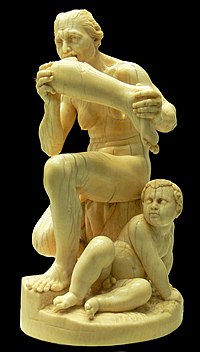 |
| The Common Bad |
Thereafter, it becomes increasingly difficult to get back on track, which is to decrease then reverse that national decline, returning to the business of the common good.
One reason that it becomes increasingly difficult to get back on track is that the definition of the common good becomes more and more unclear.
The consensus that had at an earlier time defined the common good begins to evaporate as the ethical social awareness within that nation continues to decline.
The inevitable national decline continues to feed on itself in what could be called a form of social or cultural cannibalism depicted and indicated artfully by the photo of a sculpture, which for this post has been captioned "The Common Bad."
We can say, then, that national decline begins with a loss of vision about what the future holds for any nation that loosens its moorings to the understanding of the meaning of "the common good."
Thus, national decline can be defined as an increase in the common bad along with a concurrent decrease of the common good.
In the United States, for some time now, the health and well being of "the middle class and the poor" has been a measure of our understanding of the common good.
The online encyclopedia states:
The common good or common weal is a term that can refer to several different concepts. In the popular meaning, the common good describes a specific "good" that is shared and beneficial for all (or most) members of a given community. This is also how the common good is broadly defined in philosophy, ethics, and political science.(Wikipedia, "Common Good", emphasis added). The "middle class and poor" is an obvious representative for the standard, because those are the common people, as shown by the history and definition of the phrase "the common weal" which is the old English form of "the common good":
com·mon·weal (kmn-wl)(The Free Dictionary, emphasis added). A look at the synonymous term "Commonwealth" adds clarity:
n.
1. The public good or welfare.
2. Archaic A commonwealth or republic.
...
commonweal [ˈkɒmənˌwiːl]
n Archaic
1. the good of the community
2. (Government, Politics & Diplomacy) another name for commonwealth
...
com′mon•weal` or com′mon weal`,
n.
1. the common welfare; public good.
2. Archaic. a commonwealth.
[1350–1400]
...
Thesaurus Legend: Synonyms Related Words Antonyms
Noun 1. commonweal - the good of a community
Commonwealth is a traditional English term for a political community founded for the common good.(Wikipedia, "Commonwealth", emphasis added). This was the purpose for the founding of the nation and The U.S. Constitution:
...
The English noun commonwealth in the sense meaning "public welfare; general good or advantage" dates from the 15th century. The original phrase "the common-wealth" or "the common weal" (echoed in the modern synonym "public weal") comes from the old meaning of "wealth," which is "well-being"...
We the People of the United States, in Order to form a more perfect Union, establish Justice, insure domestic Tranquility, provide for the common defence, promote the general Welfare, and secure the Blessings of Liberty to ourselves and our Posterity, do ordain and establish this Constitution for the United States of America.(Wikipedia, "Preamble", emphasis added). The "general" or "common" issues, that establish the common good or the common weal, were the general foundational purposes of the Constitution (the "... preamble indicates the general purposes for which the people ordained and established the Constitution ...", Jacobson v. Massachusetts, 197 U.S. 11, 22 (1905); emphasis added).
Since this post is getting long, and the foundation for future posts in this series is now established, I will stop for today.
The next post in this series is here.
The common good is currently non-existant:
ReplyDelete"The problem starts with poverty. Infant mortality rates for black families in Pittsburgh are worse than in Vietnam; male life expectancy in Washington, DC is lower than it is the Gaza Strip.
Poverty rates in some black and Latino neighbourhoods in almost every city are higher than 50%. In some, violence is rampant. By one estimate, between 20% and 30% Chicago school children have witnessed a shooting. The US now has more people in its penal system than the Soviet Union did at the height of the gulag system."
Link